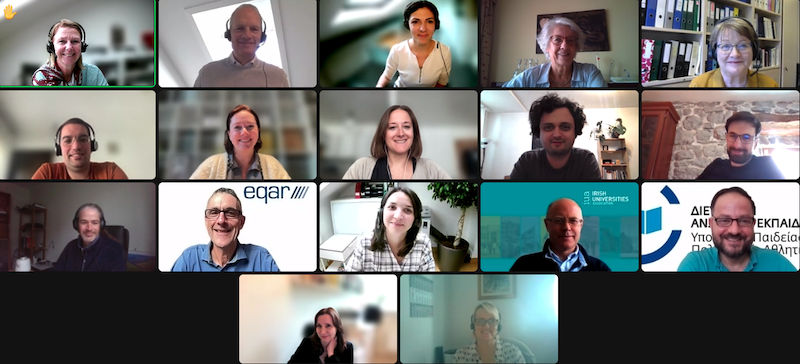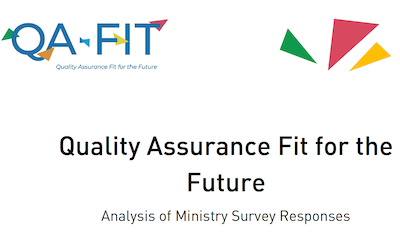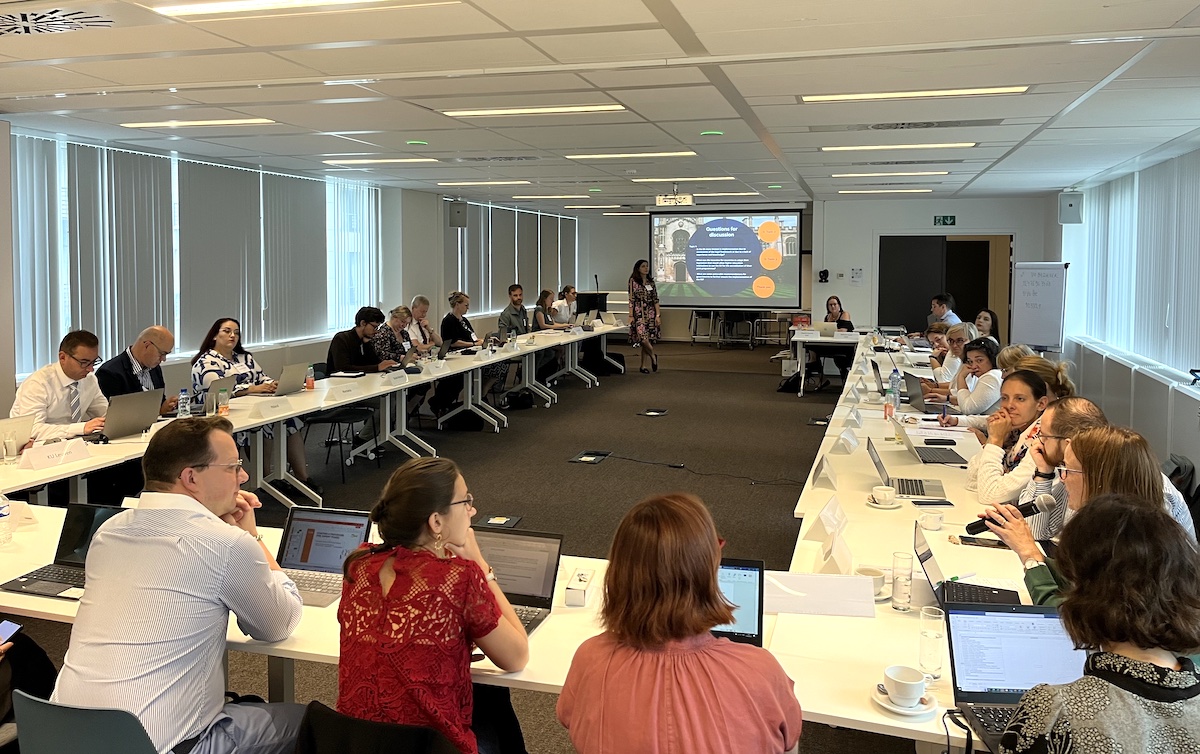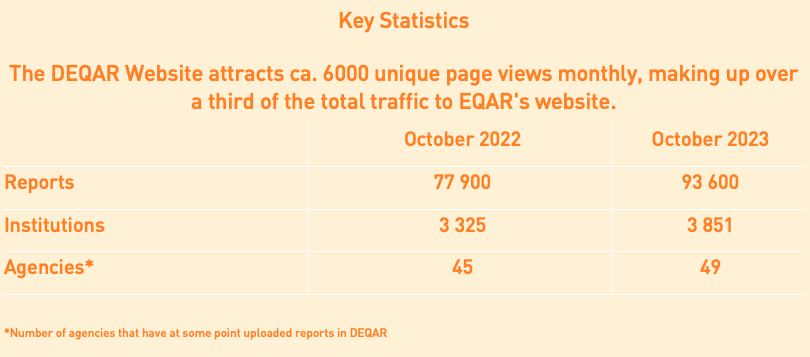EQAR NEWSLETTER - OCTOBER 2023
News: Register Committee | Job opportunity: Policy and Project Officer | Publication QA Fit analysis | IMINQA | TPG-LRC CoRE | DEQAR: fit and full of purpose! | EQAR Members' Dialogue
Register Committee
 The latest Register Committee (RC) meeting was held online on 12-13 October. The Committee reviewed and considered several applications and found the following agencies operating in substantial compliance with the ESG:
The latest Register Committee (RC) meeting was held online on 12-13 October. The Committee reviewed and considered several applications and found the following agencies operating in substantial compliance with the ESG:
-
EAEVE - European Association of Establishments for Veterinary Education
EAEVE reports in DEQAR - KAZSEE - Kazakhstan Association of Modern (Elite) Education (initial application)
-
NEEA - National Evaluation and Accreditation Agency (Bulgaria)
NEEA reports in DEQAR -
QAA - Quality Assurance Agency for Higher Education (UK)
QAA reports in DEQAR -
SQAA - Slovenian Quality Assurance Agency (Slovenia)
SQAA reports in DEQAR
The Register Committee also discussed the EQAR strategy and considered some updates to its Use and Interpretation of the ESG and the proposed online consultation thereof. The fourth Register Committee meeting of 2023 will take place in Paris on 11-12 December.
This was the first meeting for Sandra Bezjak, Inga Lapina and Lewis Purser as RC members. Their nominations were approved by the General Assembly on 10 May 2023, with their mandate starting on 1 July 2023. Another first was for our President, Stéphane Lauwick, it was his debut in chairing the RC meeting.
Job opportunity: Policy and Project Officer
The EQAR Secretariat is looking for a Policy & Project Officer to join our dynamic and international team. 
Responsibilities (in a nutshell):
- Manage the Register & support the EQAR Register Committee
- Maintain & develop DEQAR
- Do project work to support the realisation of the EHEA (desk research, analyses, cooperate with project and other partners)
Ideal profile (among others):
- At least 3 years’ experience in European higher education policy
- Understanding or experience in the field of relational databases and good IT skills
- Outstanding organisational and communication skills
- Skills in the field of statistics and related IT tools are an asset
- Available to travel within Europe occasionally (+/- 5 trips per year)
⇒ More about the job, the requirements, what we offer and how to apply
This vacancy is coming up because Melinda Szabo is leaving EQAR at the end of the year. We thank Melinda for her ten years (!) of commitment, dedication and enthusiasm. We will certainly miss her, as well as her expertise, devotion and collegiality!
Publication QA Fit analysis
We are pleased to announce that EQAR has finalised the “Analysis of Ministry Survey Responses” in the framework of the “Quality Assurance Fit for the Future” project. 
The aim of the Quality Assurance Fit for the Future (QA FIT) project is to comprehensively assess the state of quality assurance within the EHEA and to evaluate whether the ESG are ready for the future and to ascertain whether an expansion of their scope is warranted. Furthermore, the project endeavours to solicit diverse viewpoints concerning the future trajectory of quality assurance within the EHEA.
To this end, surveys have been sent out to the main quality assurance stakeholders, namely higher education institutions, students, quality assurance agencies, and ministries. The survey to the ministries, EQAR’s responsibility of the project, yielded some very interesting results, which have been scrutinised and interpreted in the "Analysis of Ministry Survey Responses".
The survey results show that external QA results have led countries to introduce new (cluster) accreditation models, to review their provisions on the organisation of the quality assurance bodies, to transition from a centralised planning in education management to a greater autonomy of institutions, to facilitate the cooperation in the development of joint degree programmes, to change the system of financing in higher education (introducing a performance-related approach).
An overwhelming majority of respondents agreed that the development and implementation of QA had a positive impact on their higher education system and underscored the role of the ESG's in fostering transparency and trust among member countries with a focus on accountability-driven objectives.
Considering the future perspective of the ESG, most of the ministry representatives agree that some form of minor or major revision of the current ESG is needed, and that fundamental values and social dimension issues should be addressed to some extent.
⇒ Read more and download the Analysis
The next step of the QA Fit project is the QA FIT Focus Group for ministries, which is organised in conjunction with the Members' Dialogue in Granada, coming up on 9 and 10 November. The Focus Group is organised to discuss in detail the matters arising from the QA FIT two cross-cutting papers, including perspectives of all stakeholder groups (students, universities, professional HEIs, QA agencies) as well as the future implications for the European framework for quality assurance.
IMINQA
“Implementation and Innovation in QA through peer learning” (IMINQA) is an umbrella project to support the work of the Bologna Thematic Peer Group C on Quality Assurance. The project includes several activities, such as the Staff Mobility programme, the Peer Learning Activities (PLA’s) and the Working Group on the QA of Micro-credentials.
The third and last of the PLAs on EHEA policy priorities in QA, took place in Brussels on 13 September, having as main topic the European Approach for QA of Joint Programmes (EA).
It was a day of insightful presentations and animated discussions. Some impressions and takeaways to mull over:
- Even though the EA is not well known enough (both within HEIs and within ministries),
it is clear that it has received an enormous impetus through the European University Alliances. - It’s important to remember the EA was adopted by Ministers (in 2015).
- There has been a lack of political pressure from stakeholders. Only recently, through various new developments (such as the European Universities Initiative), there is a higher demand for it.
- There is a need for shared terminology or understanding, especially with regard to double degrees and joint programmes etc. to make the EA work better.
- How to consider the EA in light of the revised ESG, should it become part of it?
All three IMINQA PLAs were open to members of the Thematic Peer Group (TPG) C on Quality Assurance. Each PLA was informed by a thematic preparatory note based on existing analyses, data and reports, complemented by additional analysis (e.g. surveys, focus groups) where required.
The end objective of this exercise is to draft a cross-cutting policy brief based on all three PLAs, which will inform the preparations of the Tirana Ministerial Conference 2024.
⇒ More about the IMINQA PLAs and the preparatory notes
At the IMINQA Working Group meeting on the QA of micro-credentials, which took place on 14 September, EQAR presented the first results in the database after four quality assurance agencies had tested the new system.
Participants provided valuable feedback on the remaining dilemmas, such as the use of trustworthy national databases of education providers and the terminology used in the database. The public launch of the section on alternative providers and micro-credentials is planned to take place towards the end of 2023.
TPG-LRC CoRE
The TPG-LRC Constructing Recognition in the EHEA (TPG-LRC CoRE) project aims to support the work of the Thematic Peer Group B on the Lisbon Recognition Convention (TPG B on LRC).
Within the project, EQAR is leading the Working Group on digitalisation of recognition tools. This Working Group has organised two of the three planned peer learning webinars this autumn (with the last one planned for November), each focusing on one of the phases of the recognition process (input, throughput and output). During these webinars, good practices of implementing digital tools are showcased and participants discuss the main challenges and successes of using digital tools.
Last week, EQAR hosted the PLA on the throughput phase. NAWA (the Polish ENIC-NARIC) showcased their new interoperable system and database with integrated DEQAR API, thus extracting DEQAR data which are used in the recognition workflow.
As part of the webinar, EQAR also presented the new section for alternative providers and micro credentials in DEQAR and discussed ways for recognition stakeholders to extract this information.
DEQAR: fit and full of purpose!
Our Database of External Quality Assurance Results (DEQAR) turned five this year, high time to have a look at the newest features, the latest numbers and to brush up our memory with a quick refresher course.
What can we find in DEQAR?
 DEQAR is the Database of External Quality Assurance Results on activities performed by EQAR-registered quality assurance agencies. DEQAR not only collects their reports and decisions (i.e. accreditations and evaluations), but also helps to understand reports in their context by describing the national QA frameworks of the European Higher Education Area countries. ⇒ Check out the 1,5-minute DEQAR explainer video on our website.
DEQAR is the Database of External Quality Assurance Results on activities performed by EQAR-registered quality assurance agencies. DEQAR not only collects their reports and decisions (i.e. accreditations and evaluations), but also helps to understand reports in their context by describing the national QA frameworks of the European Higher Education Area countries. ⇒ Check out the 1,5-minute DEQAR explainer video on our website.
Why was DEQAR created??
While EQAR-registered QA agencies publish reports and decisions on their own websites, users had difficulties finding and accessing such information, especially from other countries and in other languages. Also, to find a report, one had to know first which QA agency had performed the review. DEQAR provides a uniform, one-stop shop access to QA results and reports.
How can you benefit from DEQAR?
Different stakeholders use DEQAR data for a myriad of reasons:
- For recognition purposes.
- To explore the diversity of external QA frameworks in Europe.
- To check out QA agencies’ previous activities.
- To issue digital credentials (this is still in a pilot phase, but the work is almost complete)
- To find QA related info on higher education institutions before teaming up with them.
- As a source of objective QA related info when choosing to study abroad.
- To learn more about a potential employee’s HEI or degree.
- As a basis for Europe-wide thematic studies using advanced analytical tools.
What's new and what's next?
- NAWA, the Polish ENIC-NARIC, recently completed their new interoperable system and database with integrated DEQAR API, thus extracting DEQAR data which they then use in their recognition workflow. NAWA showcased this at the second PLA webinar of the TPG LRC Core project that was organised on 19 October.
- On the orange search box of DEQAR, you will now find the latest (synchronised) number of reports and HEIs in DEQAR.
- EQAR is in the final stages of introducing of a section on alternative providers and micro credentials evaluated through methodologies aligned with the ESG in DEQAR. The final data model has been agreed on and we hope to launch it before long. The system will soon be opened for all registered EQAR agencies to upload their reports on these provisions. Stay tuned!
- During the DEQAR CONNECT project, EQAR developed an interface to export DEQAR data to the accreditation database underpinning the European Digital Credentials for Learning (EDCI). While the interface has been complete on EQAR’s side for a while, the accreditation-related features of EDC are not yet fully functional, hence preventing the use of that interface. As it stands, the European Commission will be launching the DEQAR feature before the end of 2023, which will include full support for accreditation-related features. Stay tuned for this as well!
- EQAR also collaborates with the European Commission on another initiative for issuing verifiable credentials - the European Blockchain Services Infrastructure (EBSI). Higher education institutions having valid accreditation in DEQAR can download a file unique to their institution from the website and further use it in the EBSI workflows to issue a verifiable credential.
⇒ Read more about the verifiable credentials
EQAR Members' Dialogue
The EQAR Members’ Dialogue is soon coming up! The event is hosted by the University of Granada and will be held on 9-10 November 2023. The two main topics are:
- The EQAR strategy 2024-2028
Members will discuss the topics and priorities for the next EQAR Strategy. - The QA FIT Focus Group (for ministries)
The Focus Group is organised to discuss in detail some of the matters arising from the QA FIT surveys, including implications for innovation in quality assurance, both within and outside the scope of the ESG. Cross-cutting issues and perspectives of the other stakeholder groups (students, universities, professional HEIs, QA agencies) will also be tackled.
The Members’ Dialogue is only open to members of EQAR, not to registered agencies.

